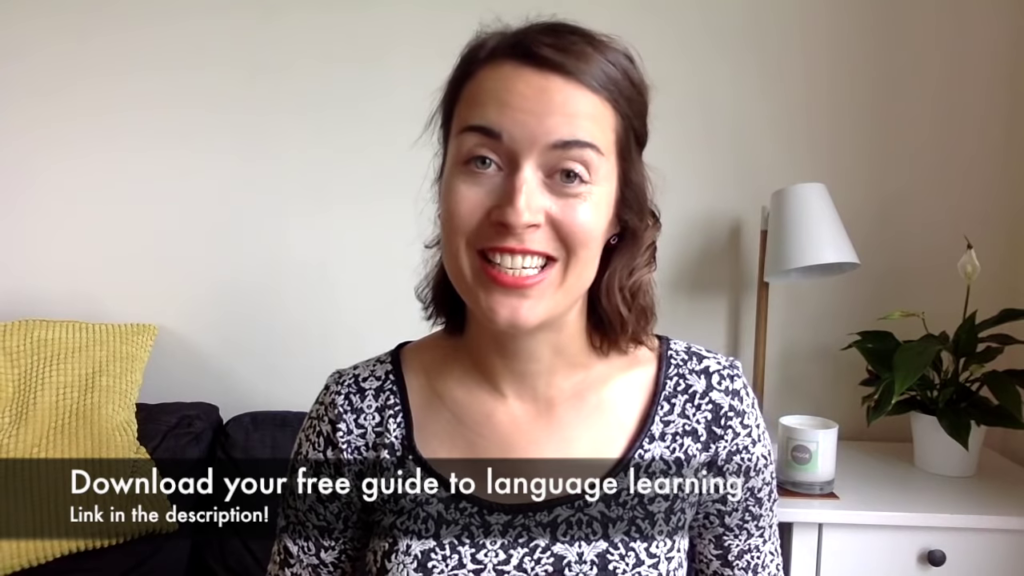Vídeo | How to create a language learning routine
Este vídeo, com duração de 5m34s e de autoria de Agnieska, do canal Five Minute Language, traz algumas dicas muito interessantes sobre como criar uma rotina para o aprendizado de idiomas.
Uma sugestão genial é o que ela chama de dead time, ou tempo morto. Dead time são aqueles momentos do dia em que você fica parado esperando por algo, como por exemplo, esperar que a comida cozinhe ou algo do tipo. Ela sugere que aproveitemos ativamente estes dead times para aprender algo novo no idioma que estamos estudando.
Um outro conselho muito importante é começar pequeno. Estabeleça metas pequenas, fáceis de serem alcançadas, pois fica mais fácil começar, e uma vez que você comece, fica ainda mais fácil ir além.
Clique aqui para assistir o vídeo no Youtube!
A tabela abaixo contém a transcrição em inglês da apresentação, o áudio em inglês, e a tradução em português.
#Enjoy!
| English Transcript | Tradução |
|---|---|
| Hi everyone it's Agnieska from five minute language. | Olá a todos, aqui é a Agnieska do canal Idiomas em cinco minutos. |
| Welcome to my channel, | Bem-vindo ao meu canal, |
| make sure you subscribe if you haven't already and give this video a thumbs up. | não se esqueça de se inscrever, se ainda não o fez, e dê um joinha neste vídeo. |
| I'm really excited about this video | Estou muito empolgada com este vídeo |
| because something that a lot of you guys have requested before | porque é algo que muitos de vocês pediram antes |
| and it's a video about how to develop a language learning routine. | e é um vídeo sobre como desenvolver uma rotina para o aprendizado de idiomas. |
| Routines are very important | Rotinas são muito importantes |
| because obviously when you're learning a language | porque obviamente quando você está aprendendo um idioma |
| it's very easy to get demotivated | é muito fácil ficar desmotivado |
| and it's very easy to kind of let other things get in the way of language learning. | e é muito fácil deixar que outras coisas atrapalhem o aprendizado de idiomas. |
| So developing a routine will help you prevent that | Portanto, desenvolver uma rotina lhe ajudará a impedir isto |
| and it will help you stay on track and keep motivated. | e te ajudará a permanecer no caminho certo e a se manter motivado. |
| Let's get started there. | Vamos começar por aí. |
| Let's look at the top tips for creating a language learning routine. | Vejamos as principais dicas para criar uma rotina de aprendizado de idiomas. |
| So when talking about routines | Então, ao se falar de rotinas |
| I always think about this metaphor | eu sempre penso nessa metáfora |
| that I read somewhere | que eu li em algum lugar |
| which is basically a metaphor | que é basicamente uma metáfora |
| and which involves flossing your teeth | e que envolve o uso do fio dental |
| and it's something I read somewhere. | e é algo que eu li em algum lugar. |
| It really stuck with me. | Eu realmente não consegui esquecer disto. |
| It's basically that many people don't actually floss their teeth. | O fato é que, basicamente, muitas pessoas realmente não usam fio dental. |
| They just brush their teeth | Elas apenas escovam os dentes |
| because they see flossing as a kind of extra step | porque elas veem o fio dental como uma espécie de passo extra |
| in addition to brushing | além de escovar os dentes |
| and they're not very motivated to do it. | e elas não estão muito motivados para fazê-lo. |
| So what this person recommended | Então, o que essa pessoa recomendou |
| was that you start with flossing just one tooth every day | foi que você use o fio dental em apenas um dente todos os dias |
| and whilst you're doing the flossing | e enquanto você está usando o fio dental |
| you might actually find | você pode realmente descobrir |
| that you don't mind doing the rest of your teeth | que não se importa de usar o fio dental no resto dos dentes |
| or you might just do your upper teeth or your lower teeth. | ou você pode apenas usar o fio dental nos dentes superiores ou inferiores. |
| Whatever it is, | O que quer que seja, |
| but it's question interesting concepts | mas são conceitos interessantes |
| because it can apply to language learning | porque podem ser aplicados ao aprendizado de idiomas |
| and this is my first tip for creating your routine: | e esta é minha primeira dica para criar sua rotina: |
| Start small, start with very small steps | Comece pequeno, comece com passos muito pequenos |
| that you basically incorporate daily into your routine. | que você basicamente incorpora diariamente em sua rotina. |
| It can be something as small as learning one word every day, | Pode ser algo tão pequeno quanto aprender uma palavra todos os dias, |
| because if you commit to one word every day, | porque se você se comprometer com uma palavra todos os dias, |
| when you actually sit down to learn it, | quando você realmente se senta para aprender, |
| you will notice that you have a bit more motivation | você notará que tem um pouco mais de motivação |
| than you had before you actually sub down to do it | do que você tinha antes de realmente fazer isso |
| and you might end up learning two words or even more, | e você pode aprender duas palavras ou mais, |
| so anything you do on top of that one word will be a bonus. | então, qualquer coisa que você fizer além dessa palavra será um bônus. |
| But make sure that you commit to that one word every day. | Mas certifique-se de se comprometer com essa palavra todos os dias. |
| The second thing is do what you already do in your native language, | A segunda coisa é fazer o que você já faz na sua língua nativa, |
| but do it in the language you're learning, | mas faça no idioma que você está aprendendo, |
| so this is really easy | Isso é realmente fácil |
| because there are certain things | porque tem certas coisas |
| that are part of your routine already and you may not realize that. | que já fazem parte da sua rotina mesmo que você não perceba. |
| So, for example, | Então, por exemplo, |
| if you're looking for something to cook on Sunday nights, | se você estiver procurando algo para cozinhar nas noites de domingo, |
| if that's part of your routine to look up a new recipe, | se isso faz parte da sua rotina para procurar uma nova receita, |
| do it in the language you're learning | faça isso no idioma que você está aprendendo |
| instead of doing it in your native language. | em vez de fazê-lo na sua língua nativa. |
| So that way it's part of your routine. | Dessa forma, faz parte da sua rotina. |
| If you read the news every day | Se você ler as notícias todos os dias |
| make sure that you read at least one news story in the language you're learning. | certifique-se de ler pelo menos uma notícia no idioma que está aprendendo. |
| So make sure that you identify those actions | Portanto, certifique-se de identificar essas ações |
| which are already part of your routine | que já fazem parte da sua rotina |
| and that way you make sure | e assim você garante, |
| that when you swap them for doing them in the language you're learning | ao fazer a atividade no idioma que está aprendendo |
| you will actually make language learning part of your routine. | você tornará o aprendizado de idiomas parte de sua rotina. |
| My third tip is to write it down, | Minha terceira dica é escrever, |
| so whatever you do, | então o que quer que você faã, |
| whatever you commit to, | o que quer que você se comprometa a fazer, |
| that one little goal, | esse pequeno objetivo, |
| one word per day | uma palavra por dia |
| or reading the news | ou ler as notícias |
| or looking up a written a new recipe | ou procurar uma nova receita |
| for example that you write it down | por exemplo, que você anote |
| and that you write down your progress as well. | e que você anote também seu progresso. |
| So don't just write a to-do list | Portanto, não basta escrever uma lista de tarefas |
| but instead write it's do this | mas, em vez disso, escreva: faça isso |
| and then review it at the end of the week | e depois revise no final da semana |
| or at the end of the day | ou no final do dia |
| and make sure that you've written down the progress that you've made as well. | e certifique-se de que você anotou o progresso que também fez. |
| The good things and the bad things they're things you're proud of | As coisas boas e ruins são coisas das quais você se orgulha |
| and the things that you wish had gone a bit better | e as coisas que você deseja que tivessem sido um pouco melhores |
| so I just want to share with you a resource that I've created | então eu só quero compartilhar com você um recurso que eu criei |
| which is called the motivation journal. | que é chamado de diário de motivação. |
| I hope you can see it, | Espero que você possa ver, |
| it's basically a notebook | é basicamente um caderno |
| where you record your goals for language learning. | onde você registra suas metas para o aprendizado de idiomas. |
| I really like using it for learning | Eu realmente gosto de usá-lo para aprender |
| because it keeps me motivated | porque me mantém motivada |
| and that's why I called it the motivation journal. | e foi por isso que o chamei de diário de motivação. |
| I'm going to include the link in the description box down below | Vou incluir o link na caixa de descrição abaixo |
| but essentially the motivation journal is where you record things that you want to achieve, | mas essencialmente o diário de motivação é onde você grava as coisas que deseja alcançar, |
| things that will make each week great, | coisas que tornarão cada semana ótima, |
| and then you review it at the end of the week, | e você revisa no final da semana, |
| and you write down the things that made this week great. | e escreve as coisas que tornaram esta semana ótima. |
| And then at the end, | E então no final, |
| you write things that you want to do the following week. | você escreve coisas que deseja fazer na semana seguinte. |
| So it's kind of like a planner, | Então é como um planejamento, |
| but it's also a way for you to review your progress and celebrate success. | mas também é uma maneira de você revisar seu progresso e comemorar o sucesso. |
| And the final tip I've got for you is about finding what I call dead time, | E a dica final que eu tenho para você é encontrar o que eu chamo de tempo morto, |
| and dead time is basically time that you have | e tempo morto é basicamente o tempo que você tem |
| but you don't realize that you have. | mas não percebe que tem. |
| So for example, | Então, por exemplo, |
| when you're cooking I find that option when I'm cooking something | quando está cozinhando, acho essa opção quando estou cozinhando algo |
| and there's always a bit of time that's kind of, you know, you put the tomatoes in | e sempre há um pouco de tempo, você coloca os tomates |
| and then you have to wait five minutes until they've stood for a while | e então você tem que esperar cinco minutos até que eles fiquem em repouso por um tempo |
| so you've got five minutes when you're not actually doing anything | então você tem cinco minutos em que não tem nada para fazer |
| and I think having that time or realizing that you have that time | e acho que ter esse tempo ou perceber que você tem esse tempo |
| is a really great thing for language learning | é realmente ótimo para o aprendizado de idiomas |
| because that's when you can pick up your book or your notebook | porque é aí que você pode pegar seu livro ou seu notebook |
| and do a little bit of revision | e fazer um pouco de revisão |
| or just learn a few new words or try to speak to yourself. | ou apenas aprender algumas novas palavras ou tentar falar consigo mesma. |
| For example, which I sometimes do when I'm cooking | Por exemplo, é isto que às vezes faço quando estou cozinhando |
| so I hope you enjoyed this video | então espero que tenham gostado deste vídeo |
| and make sure that you share with me your favorite tips for establishing a language learning routine. | e compartilhem comigo suas dicas favoritas para estabelecer uma rotina de aprendizado de idiomas. |
| Subscribe to the channel for more videos like this one | Inscreva-se no canal para ver mais vídeos como este |
| and make sure you give this video a thumbs up as well | e certifique-se de dar um like no vídeo também |
| Thanks for watching and I'll see you next time bye | Obrigado por assistir e até a próxima. Tchau |









